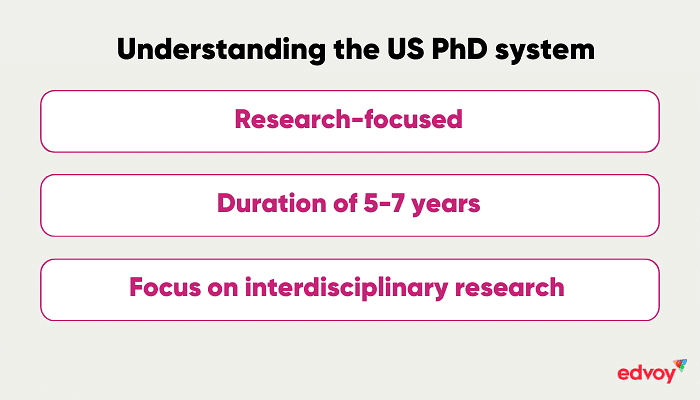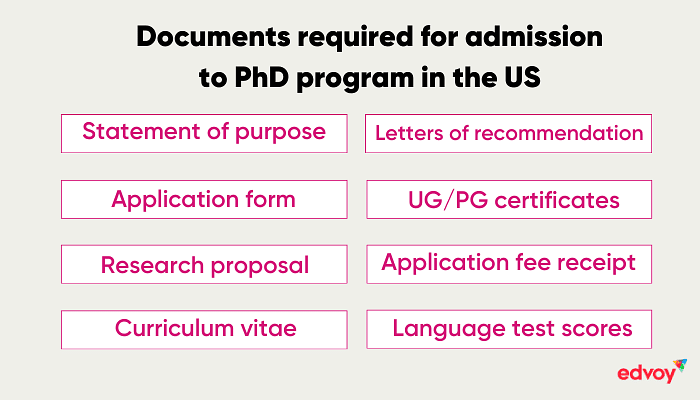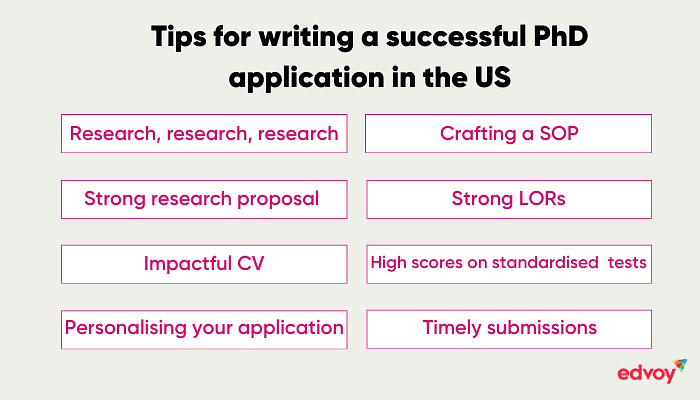Studying abroad isn’t just a dream—it’s your future. Let’s make it happen!
Key takeaways
To pursue a PhD in the US as an international student, you need –
- A bachelor's or master's degree from a recognised university with a strong academic record.
- TOEFL or IELTS scores to show your English proficiency.
- GRE or GMAT scores, depending on the program.
- Relevant coursework and research experience in the field of study.
- Minimum 3 letters from academic or professional references.
- A detailed statement explaining your research interests and career goals.
Table of Contents
- Understanding the US PhD system
- Top universities for a PhD in the US
- Admission requirements
- Tuition fee and funding options
- Tips for writing a successful PhD application in the US
- FAQs
Understanding the US PhD system
First things first: the US PhD system might be quite different from what you're used to. In most countries, a PhD is strictly research-oriented. In the US, however, PhD programs include coursework and research.
Coursework and research
In the US, PhD programs blend coursework with research. Unlike some countries where a PhD is purely research-focused, in the US, the first 2–3 years often involve classes that help build a solid theoretical foundation.
In the initial years of your PhD, you'll complete coursework to build a strong theoretical foundation in your field. Following that, you'll focus on original research, aiming to contribute new knowledge to your discipline.
Duration and structure
Typically, US PhD programs span 5 to 7 years, but this can vary based on your field and progress. During this time, you'll have a primary advisor guiding your research and a committee providing additional support.
Unique features
One unique feature of US PhD programs is the focus on interdisciplinary research. You'll often collaborate with experts from different fields, broadening your academic outlook.
Understanding these subtleties will help you set realistic expectations and prepare better for your journey.

Also read: What is a PhD?
Top universities for a PhD in the US
- Nova Southeastern University
- University of North Carolina at Greensboro
- Washington State University
- Texas State University
- Kennesaw State University
- Montclair State University
- University of Colorado Denver
- Wichita State University
- University of North Texas
- Oregon State University
Looking to do your PhD at any of these universities? We are here to help!
Admission requirements
Getting accepted into a US PhD program involves meeting certain requirements. Let's understand them.
Academic qualifications
To be accepted into a US PhD program, you must satisfy certain academic requirements.
Minimum degree requirements
The majority of programs need you to have a master's degree, although certain programs also accept just a bachelor's degree. Your previous studies must be closely related to the PhD program you wish to apply to.
GPA and academic transcripts
US universities usually require a minimum GPA, typically 3.0 on a 4.0 scale. You must provide official transcripts from all post-secondary institutions you've attended.
Standardised tests
Standardised tests are an important part of the application process.
GRE/GMAT
The GRE (Graduate Record Examination) is often required for most PhD programs. Business programs might ask for GMAT (Graduate Management Admission Test) scores. Make sure to verify the particular requirements of your desired programs.
English language proficiency tests
As an international student, you’ll need to prove your English proficiency. TOEFL and IELTS are two of the most accepted tests. Try to score high to make your application stronger.
Also read: Fully funded PhD without GRE in the USA
Documents required for admission
It’s important that you have the required documents ready to ensure a timely application for the PhD program in the US.
Statement of purpose
This is your opportunity to come out on top. Describe your academic background, research interests, and career goals. Be specific about why you are interested in pursuing a PhD at the institution and how your interests align with the faculty research expertise.
Research proposal
There are programs that demand a research proposal. This is a paper that explains your area of study and readiness to conduct research and think critically within your area.
Letters of recommendation
Strong letters from academic mentors who know you well can make a huge difference in your application. Try to get a minimum of 3 letters of recommendation, including one from a professor in your field.
Curriculum vitae (CV)
Your CV should highlight your academic achievements, research experience, publications, and any relevant work experience. Keep it concise yet informative.

Need help with the US PhD application process? We are here to help!
Tuition fee and funding options
Funding for your PhD is a major consideration. Here's everything you should know
Tuition fees and living expenses
Tuition costs for PhD studies in the US are expensive, ranging from USD 20,000 to USD 60,000 per year. Living costs depend on where you live, with urban areas being more costly. Students need to budget for accommodation, food, transport, and health insurance.
Funding options
Fortunately, most PhD students receive funding through scholarships, fellowships, or assistantships. Scholarships and fellowships are usually merit-based and don’t have to be repaid. Teaching or research assistantships offer a stipend usually and occasionally a tuition waiver in return for work.
Start by researching all available funding options. Apply for as many scholarships and grants as possible. Be mindful of your spending and create a budget that accounts for both expected and unexpected expenses.
Also read: How to study PhD abroad with scholarships for Indian students?
Tips for writing a successful PhD application in the US
Applying for a PhD in the US is a big step, and it's essential to make your application stand out. Here are some key tips to make your application stand out.
Research, research, research
- Identify your interests and define your research goals to find programs that align with your goals
- Learn about the faculty, research areas, and facilities of potential programs on their official website
- Familiarise yourself with the work of potential advisors
Crafting a statement of purpose
When writing your SOP,
- Explain what motivated you to pursue a PhD and your passion for your chosen field.
- Highlight relevant coursework, research projects, and accomplishments.
- Align your interests with the program and mention specific faculty members.
- Discuss your long-term goals and how the PhD will help you achieve them.
- Reinforce your enthusiasm and commitment.
Writing a strong research proposal
When writing your research proposal, make sure to -
- Provide a clear title and a brief summary.
- Outline the research problem, its significance, and your objectives.
- Literature review. Identify gaps in the literature.
- Describe your research methodology in detail.
- Discuss the potential impact of your research.
- Outline key milestones and phases.
Gathering strong letters of recommendation
Select recommenders who know you well and can speak for your abilities. Give recommenders your CV and details about the program. Ensure letters are submitted on time.
Preparing a curriculum vitae
When preparing your CV, make sure to-
- List your degrees, institutions, and graduation dates.
- Highlight your role and findings in research projects to show research experience
- List relevant roles, publications and presentations to show work experience.
- Highlight relevant skills.
Preparing for standardised tests
Check the specific requirements of the programs you are aiming for and apply to the exam that serves the purpose. Aim for high scores on TOEFL or IELTS. Start early, use study guides, and take practice tests.
Personalising your application
Customise your SOP for each program and faculty. Use your research proposal to highlight alignment with the program and emphasise relevant experiences and skills in your CV.
Submitting your application
Double check that all documents are complete and match the requirements of the PhD program. Proofread documents to avoid errors and typos in SOP, LOR and more. Submit your application early. Allow some extra time for unexpected issues.

A PhD in the US is rewarding. By following these tips, you'll increase your chances of success.
Student life in the US as an international PhD student
Adjusting to life as an international PhD student in the US can be challenging yet rewarding.
You’ll experience cultural differences and take some time getting used to them. Academic life involves balancing coursework and research with your mentor. Campus life has clubs, events, and sports facilities to keep you occupied. Building a social network is the key to well-being and professional success, so do not shy away from reaching out to colleagues and attending university events. Managing finances and budgeting is essential. Make time to explore the US over breaks. Managing homesickness requires keeping in touch with loved ones and getting advice when needed.
Pursuing a PhD in the US is no small feat. To make your study abroad smoother, we are here to help you by providing guidance on the application process, visa requirements, and finding the right university and programme that matches your aspirations.
FAQs
How to apply for a PhD in the US as an international student?
As an international student, before you apply for a PhD in the US, you should look for programs that match your interests, check their requirements, and contact professors. Prepare documents like mark sheets, recommendation letters, and a statement of purpose. Apply through the university’s online portal.
How much CGPA is required for a PhD in the US?
Most PhD programs in the US prefer a CGPA of 3.0 or higher on a 4.0 scale, but competitive programs may require 3.5 or higher.
Is IELTS required for PhD in the US?
Yes, most universities require IELTS or TOEFL scores to prove your English proficiency for international students. Check the specific requirements of each program.
Which visa is required to study PhD in the US?
You’ll need an F-1 student visa, which allows you to study at accredited US institutions. The visa process involves obtaining a Form I-20 from your university.
Who is eligible for PhD in the US?
Eligibility generally includes holding a bachelor’s or master’s degree, having a strong academic record, and meeting English proficiency and specific program requirements.
Is 7.5 a good IELTS score for the US?
Yes, a 7.5 is a good IELTS score and is typically above the minimum requirement for most universities, indicating strong English proficiency.



